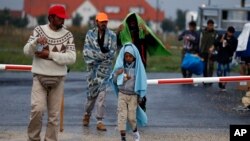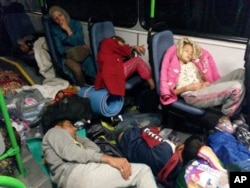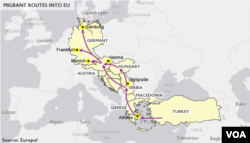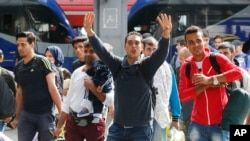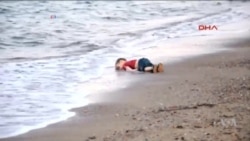Thousands of migrants who had spent days in Hungary waiting for passage west are now arriving at the Austrian border where they have been promised entry and a chance to apply for asylum.
Austria's Red Cross has been receiving the refugees at the Hegyeshalom crossing at the Austrian border. From there, many have boarded trains heading to Vienna.
Austria’s chancellor said his country and Germany will grant the migrants unhindered entry. Chancellor Werner Faymann announced the decision early Saturday after talking with German Chancellor Angela Merkel.
Faymann said the decision was prompted by the “present emergency situation on the Hungarian border.”
The refugees left Hungary's main rail station in Budapest on foot Friday after days of waiting for Hungarian officials to allow them to travel. Hungary later sent buses to pick up the hundreds of migrants spreading out along a six-lane highway as they headed west towards the Austrian border.
Back in Budapest, the Keleti station is still packed with refugees who have waited days for a chance to travel on westward-bound trains.
"What to do about this wave of refugees is still a dilemma," VOA correspondent Luis Ramirez said Saturday in Budapest, after visiting the train station. "No one disagrees that these people should get immediate help."
Ramirez says the station is showing the wear of the past week, with hundreds of refugees camped out wondering where to go. He says portable toilets are overflowing, but washing stations have been set up and food trucks are donating meals.
"It's a scene of desperation," he says. "Families sprawled out across the floor . . . . Mothers with children, young men wondering what their next step is going to be, talking about their hopes of reaching Austria and ultimately Germany, and being able to get to a place where they will be safe and where they will have everything they need."
Hungary had refused to let the refugees board westward trains in an effort to comply with European Union regulations that require they be registered in the first country they get to. But the refugees, in turn, had refused to go to processing centers, hoping to move on and register somewhere else where the economy is stronger.
On Friday, about 350 people fled a train at the Bicske Station outside of Budapest and broke through a police line before running west towards Austria. The startled police tried with little success to block the migrants and push them back onto the train.
Keleti station
“It’s a difficult thing to see,” said Stephan Ryan, with Red Cross Budapest. Late Thursday, he visited the Keleti Train Station where thousands of migrants have been forced to camp out after train service was halted Tuesday. “Unfortunately, the train station is not designed to be a camp for refugees.
Looking tired and haggard, Ryan told VOA via Skpe that as much as the refugees need food, water and shelter, they are even more in need of “clarity on what the European Union is going to be able to do.”
The 28-member European Union plans to hold emergency talks on the refugee issue on September 14. French, German and Italian leaders have said there must be a compulsory and fair distribution of refugees across the Union.
In the meantime, in Hungary, where a border fence is being built to keep migrants out, lawmakers Friday considered changes to the penal code to impose tougher penalties on migrants.
“We should start calling them by their names.” Ryan says, taking exception to the term “migrants.”
“These are individuals and families. They are not just numbers,” he said.
Ryan said that to him and other fellow aid workers, the crisis is very personal.
“The moment they [aid workers] start to speak to these refugees, they start to hear their stories and understand the reasons why they have no choice but to make this journey, then this crisis has a human face.”
Watch related video
Alan Kurdi
In Kobani, Syria, Abdullah Kurdi buried his wife and two sons on Friday.
The body of Kurdi's 3-year-old son, Alan, a Syrian Kurd, was photographed and shared in media worldwide after he was found lifeless on a Turkish beach this week. He and his mother and brother died after their boat capsized on the journey to the Greek Island of Kos, having set off from the Turkish town of Bodrum.
Before the burial, Kurdi told of the moment his children "slipped from his hands."
The pitch-black night was pierced with their screaming voices, he said, while he tried desperately to save his family.
“The whole thing took four minutes," he said. "We got in the middle of the sea. The waves were very, very strong and high. The Turkish captain ran away and went back to Turkey. I grabbed the steering wheel, and it is not difficult if one can do that. The second waves turned the boat upside down. This happened in a matter of seconds. I reached for my kids and wife, God bless her soul, and hoped they would gasp for air, but it was too late. There was nothing I could do for them.”
While pressure is rising on European governments to tackle the refugee crisis more effectively, the weeping father called on countries closer to home to act.
"I want Arab governments — not European countries — to see [what happened to] my children, and because of them to help people," he said in footage posted online by a local radio station.
A game changer?
The Kurdis are among hundreds of thousands of migrants from Syria, Afghanistan and Iraq who have been taking desperate steps since January to try to reach the European Union, trying to escape war and poverty for safety and opportunity.
Yet, to many around the world, Alan has become the human face of the refugee crisis. Ryan said it is a game changer.
“For many people around the world, when they see large numbers of migrants, they might get quite frightened about what this is going to mean for their community, their jobs, for their economy,” said Ryan.
Yet he added that kind of thinking is changing in Europe. “A human face is coming to these big numbers, and the general public is responding far more positively to this emergency."




